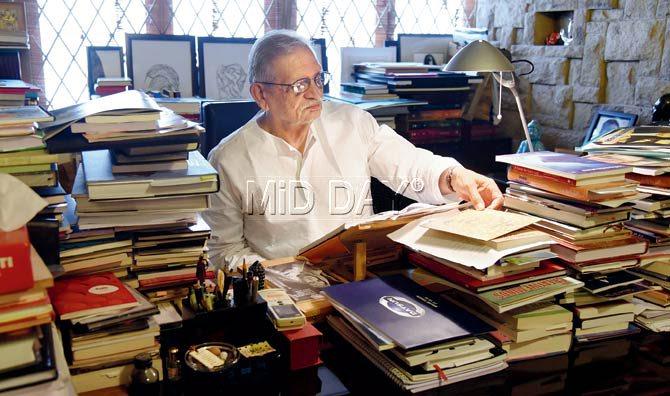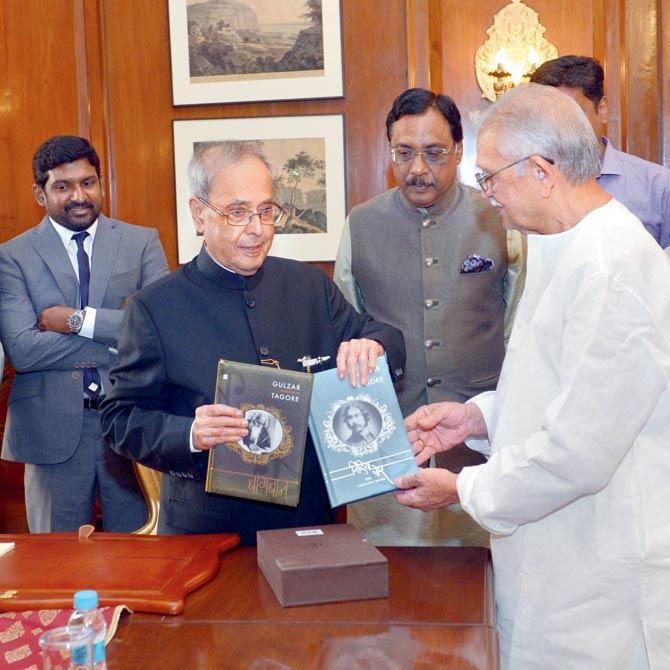Gulzar discusses about the importance and challenges of translating Rabindranath Tagore's work into Hindi

Sunlight enters the room gently, lighting up parts and leaving out cool darker spaces of the Pali Hill home. On one side, there is a huge table with thick wood legs and books spread out on the glass slab on it; one left near the chair slightly folded, with the air of being in currency, being read. A little away, the owner of the books, the table and the room, settles down on the chair with a cup of tea. The tea, without milk and sugar, glistens in the light entering from the window and his dress — loose fitting bright white kurta-pyjama looks brighter. In a pleasantly deep and poised voice, he discusses Rabindranath Tagore.

Gulzar in his study with a collection of books. His collection has for many years included the complete works of Tagore. Pic/Nimesh Dave
Though fulfilling almost all the ingredients of a stereotypical or imagined Bengali adda, the discussion though begins in Hindi, as the owner of the voice and the rest, is one of the foremost poets of Hindustani — Gulzar. As it proceeds, he asserts, "Tagore should be a part of school syllabus. Every child in India should grow up reading Tagore. His poetry should become a part of their life."

The poet presents both titles to Pranab Mukherjee, the President of India
Translating Tagore
A little surprised that he could be unaware, it becomes imperative then to point out that poems like, ‘Where the mind is without fear’ have been a part of the English syllabus for long. He smiles and says, "But that is not Tagore." The clipped response has a much larger thought behind it, which has resulted in the translation of two volumes of Tagore’s poetry into Hindi by him. One collection titled, Nindiya Chor with poems for children and the other titled, Bagban that comprises denser, more romantic and at times darker poems.
Gulzar says that there is hardly any good translation of Tagore in Hindi or Urdu and that is because these translations are not directly from Bengali but from the English translations done by Tagore himself. "Reading the English translations, it is clear that Gurudev has been unfair to his poetry," he says and adds that the richness of the poems in Bengali is lost to a great extent in Tagore’s English translations as he often edits and changes them mercilessly.
The multilingual poet’s journey with Tagore started over six decades in Kolkata, when a local library’s librarian tried to dissuade a teenaged Gulzar devouring one thriller after the other with an Urdu copy of Tagore’s poetry collection, Gardener. The impact of the poetry was such that Gulzar admits to have never returned that copy to the library. It also, possibly, marked a long tryst of the poet with the Bengali language and authors and poets of the language. In the years to come, he would translate the legendary poets Jibananda Das, Subhash Mukhopadhyay and Sunil Gangopadhyay.
 Nindiya Chor and Baaghban, Rabindranath Tagore, translated by Gulzar, HarperCollins India, Rs 999. Available at bookstores and e-stores
Nindiya Chor and Baaghban, Rabindranath Tagore, translated by Gulzar, HarperCollins India, Rs 999. Available at bookstores and e-stores
"Sunil Gangopadhyay and Samaresh Basu were dear friends," he says. And recollects his association with Basu while working on the Hindi script of the film, Amrit Kumbh Ki Khoj Me based on Samaresh Basu's novel Amrita Kumbher Sandhaney (a novel that explores the Kumbh Mela). In the six decades in between he did attempt snitches of translation of Tagore. "I was a little nervous. One can only translate Gurudev with trepidation," he smiles and informs that he has been reading out Tagore’s poems and stories for the public for long.
His voice, our voice
But does Gulzar the poet come into his translations? He asserts that a person who translates poetry has to be a poet.
"It is not just about words. It is about the feel, the rhythm and the meter that makes a translation work. I have translated the poems in the same rhythm, which was a very challenging task and I hope I have been able to do justice with the feel of the poems," he says. He also lauds the publishers to be brave enough to take up the challenge to publish an expensive book with poems in three languages in a world where allegedly people are reading less in general and very little poetry in particular. With critics though the book has had a good start.
"A big pat came from Pritish Nandy, which was very encouraging. He is a man who does not mince words," he points out.
Nindiya Chor and Baaghban
Translating poetry is perhaps the tallest of literary challenges. So much so that even arguably the greatest modern poet of the subcontinent, Rabindranath Tagore has not been praised much for translating his own poetry into English.
The task at hand, thus, was of immeasurable proportions for Gulzar when he sat down to translate two collections of poems by this less praised translator but giant of world literature, into Hindi. But with the magic wand that Gulzar commands language and words, the master eased into the work of Tagore and returned with the rhythm and the sensitivity intact, in Hindi.
The two collections are titled, Nindiya Chor (Crescent Moon in English) and Baaghban (The Gardener in English). In the poem titled Defamation in English, Tagore playfully engages with a child who has attained disrepute for his disdain for order, which Gulzar titles Nukhtachini. In it he ceaselessly moves from the voice of command of an older person to the voice of a friend with the use of the Bengali word – tui, which Gulzar finds an immediate translation in the Hindi – tu. The English version, however, lacks that swing of voice. How much can you do with just ‘you’ after all? But things were not so simple with the denser title, Poet’s Age.
The Hindi word Kavi has been rejected for the Urdu, Shayar here. Both exist in Hindustani but the choice does tell us about his understanding of Bengali and its phonetics.
– Dipanjan Sinha
 Subscribe today by clicking the link and stay updated with the latest news!" Click here!
Subscribe today by clicking the link and stay updated with the latest news!" Click here!





